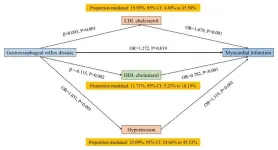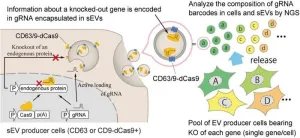(Press-News.org)
A recent study published in the Journal of Translational Internal Medicine (https://doi.org/10.1515/jtim-2024-0017) reveals significant insights into the broader impact of gastroesophageal reflux disease (GERD) on cardiovascular health. By using a rigorous bidirectional Mendelian randomization (MR) approach, the research provides compelling evidence that GERD—a condition traditionally recognized as a digestive disorder characterized by acid reflux and heartburn—may influence key cardiovascular risk factors, including blood pressure, lipid profiles, and heart disease risk.
This groundbreaking study suggests that GERD’s effects may extend beyond the digestive system, potentially playing an important role in cardiovascular health. "Our research highlights that GERD may significantly impact cardiovascular risk, offering a more comprehensive view of its influence," said Qiang Wu, from the Senior Department of Cardiology at the Sixth Medical Center of the Chinese PLA General Hospital in Beijing, China.
The use of bidirectional Mendelian randomization provides an advantage over traditional studies by controlling for confounding factors and addressing reverse causality. This approach, which employs genetic data to make causal inferences, provides a stronger basis for understanding how GERD might influence cardiovascular outcomes. Genetic variants associated with GERD were used as instrumental variables, allowing researchers to investigate GERD's potential causal role in cardiovascular conditions with greater accuracy, according to Qiang Su, from the Department of Cardiology at Jiangbin Hospital of Guangxi Zhuang Autonomous Region. The study applied a two-sample MR approach, drawing data from genome-wide association studies (GWAS) involving more than 600,000 participants, including 129,000 diagnosed GERD cases, while cardiovascular data were obtained from a European cohort of over 200,000 individuals. The researchers focused on key blood pressure metrics such as systolic blood pressure (SBP), diastolic blood pressure (DBP), pulse pressure (PP), and mean arterial pressure (MAP).
The study employed several advanced MR techniques, including Inverse Variance Weighted (IVW) analysis, MR Egger regression, and the Weighted Median approach. These methods controlled for pleiotropic effects, where one gene affects multiple traits, thereby enhancing the reliability of the findings. This rigorous approach led researchers to conclude that GERD could significantly impact cardiovascular risk factors, particularly blood pressure and lipid levels.
One of the study’s most notable findings was a strong association between GERD and elevated blood pressure. The researchers observed that genetically predicted GERD was linked to higher systolic blood pressure (SBP) (β = 0.053, P = 0.036) and diastolic blood pressure (DBP) (β = 0.100, P < 0.001), suggesting that GERD could worsen hypertension—a major risk factor for heart disease and stroke.
In terms of lipid profiles, the study indicated that GERD was associated with increased levels of low-density lipoprotein (LDL) cholesterol (β = 0.093, P < 0.001) and triglycerides (β = 0.153, P < 0.001), both of which are associated with a higher risk of cardiovascular disease. Conversely, GERD was inversely associated with high-density lipoprotein (HDL) cholesterol (β = -0.115, P = 0.002), often considered the “good” cholesterol that protects against heart disease.
Moreover, the research showed that GERD elevates the risk of cardiovascular diseases such as myocardial infarction (heart attack) and hypertension. Specifically, the odds ratio for myocardial infarction was 1.272 (95% CI: 1.040 to 1.557, P = 0.019), and for hypertension, it was 1.357 (95% CI: 1.222 to 1.507, P < 0.001). However, no significant association was found between GERD and heart failure.
"These findings indicate that GERD may be a potential risk factor for cardiovascular diseases," said Qiang Su of Jiangbin Hospital. "By revealing these associations, our study underscores the importance of early diagnosis and prevention strategies for both GERD and cardiovascular conditions."
This study emphasizes the need for increased awareness of GERD’s potential cardiovascular implications. With millions affected by GERD worldwide, these findings could encourage healthcare providers to adopt more proactive approaches for individuals at risk.
END
Repeated exposure to lies online may influence the beliefs of professional content moderators, with consequences for online platforms. Hundreds of thousands of content moderators, typically based in non-Western countries, identify and weed out problematic and false content on social platforms. However, constant exposure to misinformation could convince some content moderators that false claims are true, in what is known as the “illusory truth effect.” Hause Lin and colleagues assessed the extent of this effect among professional content moderators in India and the Philippines and explored whether encouraging an accuracy mindset reduces the effect. ...
COLUMBUS, Ohio – While comics have become a culturally popular and widely studied art form in recent decades, one format remains overlooked: the single-panel comic.
Comics like “The Family Circus,” “Ziggy” and “Little Lulu” are often seen as simplistic and not worthy of critical attention, argues Michelle Ann Abate, author of the new book Singular Sensations: A Cultural History of One-Panel Comics in the United States.
“There tends to be a belief there ...
PULLMAN, Wash. — Unlike kids in the United States, hunter-gatherer children in the Congo Basin have often learned how to hunt, identify edible plants and care for babies by the tender age of six or seven.
This rapid learning is facilitated by a unique social environment where cultural knowledge is passed down not just from parents but from the broader community, according to a new Washington State University-led study in the Proceedings of the National Academy of Sciences.
The research helps explain how many cultural traits have been preserved for thousands of years among ...
US Latinos who rely on social media in Spanish for their news are more vulnerable to political misinformation than those who use English-language social media, according to a study. Misinformation swirls on social media in every language, but social media companies struggle to combat disinformation circulating in Spanish on major social media platforms. In a study done in partnership with Jonathan Nagler of NYU’s Center for Social Media and Politics as part of the group’s Bilingual Election Monitor project, Marisa Abrajano and colleagues surveyed over 1,000 English-dominant, bilingual, and Spanish-dominant Latino users of ...
A new study led by RMIT University in Australia measuring access to nature for eight major global cities found most still have inadequate canopy cover, despite access to an abundance of trees.
Less than 30% of buildings in New York City, Amsterdam, Buenos Aires, Denver, central Sydney and central Melbourne were in neighbourhoods with adequate canopy cover.
New York and Amsterdam both scored almost 0% for canopy cover despite 92% and 50% of buildings having views of at least three trees, respectively.
The research, a collaboration with the Technical University of Munich, studied over 2.5 million buildings across ...
Genes aren’t the sole driver instructing cells to build multicellular structures, tissues, and organs. In a new paper published in Nature Communications, USC Stem Cell scientist Leonardo Morsut and Caltech computational biologist Matt Thomson characterize the influence of another important developmental driver: cell density, or how loosely or tightly cells are packed into a given space. In both computational models and laboratory experiments, the team of scientists used cell density as an effective tool for controlling how mouse cells pattern themselves into complex structures.
“This paper represents progress towards our big picture goal of engineering synthetic ...
Bethesda, MD (Nov. 15, 2024) — The American Gastroenterological Association (AGA) has released a new clinical guideline on the pharmacological management of moderate-to-severe ulcerative colitis, published today in Gastroenterology. This guideline groups the 12 currently available advanced treatments based on efficacy, to simplify the decision-making process for gastroenterologists and the approximately 1.25 million patients in the U.S. living with ulcerative colitis.
“Since the first biologic ...
Cell-to-cell communication through nanosized particles, working as messengers and carriers, can now be analyzed in a whole new way, thanks to a new method involving CRISPR gene-editing technology. The particles, known as small extracellular vesicles (sEVs), play an important role in the spread of disease and as potential drug carriers. The newly developed system, named CIBER, enables thousands of genes to be studied at once, by labeling sEVs with a kind of RNA “barcode.” With this, researchers hope to find what factors are involved in sEV release from ...
A new study shows land in California’s San Joaquin Valley has been sinking at record-breaking rates over the last two decades as groundwater extraction has outpaced natural recharge.
The researchers found that the average rate of sinking for the entire valley reached nearly an inch per year between 2006 and 2022.
Researchers and water managers have known that sinking, technically termed “subsidence,” was occurring over the past 20 years. But the true impact was not fully appreciated because the total subsidence had not been quantified. This was in part due to a gap in data. Satellite radar systems, which provide the most precise measure of elevation changes, ...
LA JOLLA (November 19, 2024)—Deep breath in, slow breath out… Isn’t it odd that we can self-soothe by slowing down our breathing? Humans have long used slow breathing to regulate their emotions, and practices like yoga and mindfulness have even popularized formal techniques like box breathing. Still, there has been little scientific understanding of how the brain consciously controls our breathing and whether this actually has a direct effect on our anxiety and emotional state.
Neuroscientists ...







